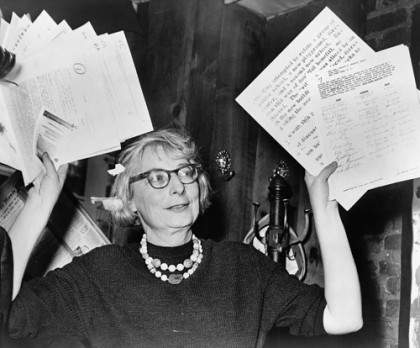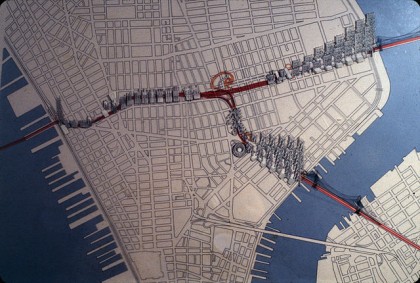Nobody but a bunch of mothers!
Jules van Schaijik | May 5, 2016
In his 1995 Letter to Women, John Paul II writes about the special contribution that women make to humanizing the world.
Progress usually tends to be measured according to the criteria of science and technology. Nor from this point of view has the contribution of women been negligible. Even so, this is not the only measure of progress, nor in fact is it the principal one. Much more important is the social and ethical dimension, which deals with human relations and spiritual values. In this area … society certainly owes much to the "genius of women".
Jane Jacobs (pictured below) whose 100th birthday would have been yesterday, is a great case in point.

She was a major inspiration behind the New Urbanist movement which promotes walkable and livable cities and neighborhoods. Unlike Robert Moses, her main rival in New York who thought that "cities are created by and for [automobile] traffic", Jacobs insisted that cities are created by and for the people who live there. City planning should be community-centered not car-centered. Cars (for now) are necessary but they are not the main point of a city.
When, in the 1950s, Moses proposed to build a highway right through the middle of Washington Square Park, it was especially the mothers living nearby who opposed the plan. They saw and valued the park as a place where children biked and ran, grown-ups walked and played chess, families picnicked, etc.

These mothers were unwilling to sacrifice their quality of life, and that of their neighborhood, to a more efficient traffic pattern. So, led by Shirley Hayes, they started a grassroots protest movement against the plan. Seven years later, after Jane Jacobs had joined the movement, they succeeded not only in defeating Moses' plan, but in banning all traffic from the square. Moses' reaction is priceless, and reminded me of JPII's Letter to Women.
At a meeting about the fate of the park, he stood up, gripped the railing, and bellowed, "There is nobody against this — NOBODY, NOBODY, NOBODY, but a bunch of, a bunch of MOTHERS!" Then he stomped out.
There is another passage in the Letter that is illustrated in the life of Jane Jacobs. In paragraph 6, John Paul II expresses his admiration for women of good will who have demonstrated
…courageous initiative at a time when this was considered extremely inappropriate, the sign of a lack of femininity, a manifestation of exhibitionism, and even a sin!
In a very good article on modesty, Rebecca Bratten Weiss makes a similar point:
…morality sometimes stands in opposition to manners: when working for justice, especially, it is sometimes necessary to kick over the traces of respectability, even if this makes for bad etiquette.
Jane Jacobs found this out during her efforts to thwart Moses' plan to build the Lower Manhattan Expressway (LOMEX).

This project, now almost universally despised, was designed to streamline traffic between Long Island and New Jersey by means of a 10-lane highway through lower Manhattan, and would have destroyed several vibrant, historic neighborhoods like Little Italy and SOHO. But the usual respectable tactics of letter writing, signature gathering, and so on, proved ineffective. Those in charge paid little attention to concerns of affected parties and tried to force the plan through the necessary hoops and regulations. Then Jacobs, accidentally it seems, hit upon the only strategy that worked: she got herself arrested and jailed for disorderly conduct at a public hearing. The next day she was all over the newspapers and had drawn widespread public attention to her cause. Ignoring objections to it was no longer possible and soon afterwards the LOMEX project was dead.
Jane Jacobs was a mother and activist. She also wrote many books in which she analyzes what makes a city tick and lays down principles for building humane, sustainable and thriving cities. Her most important and influential work, long but easy to read, is The Death and Life of Great American Cities. Want to get your feet wet first? Then check out this collection of brief essays celebrating her life and legacy.
